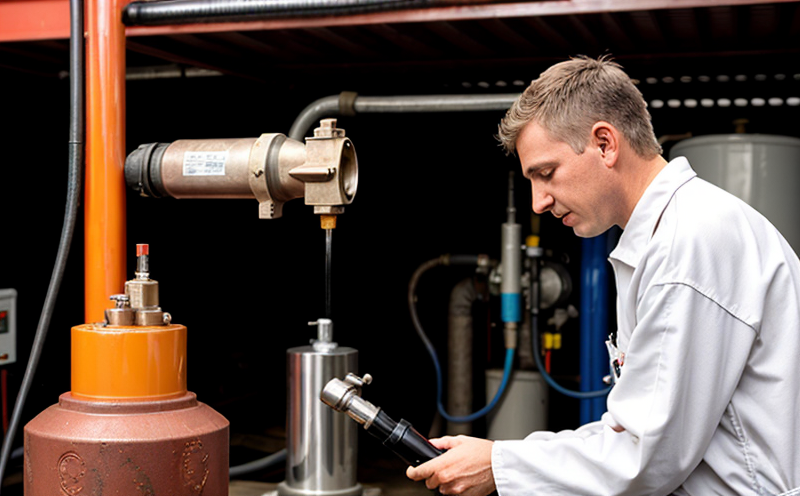ASTM D5001 Lubricity of Aviation Fuels by BOCLE Test
The ASTM D5001 standard test method is a critical tool used to measure the lubricity of aviation fuels. This test assesses the ability of fuel to reduce wear and friction in engine parts, ensuring that aircraft engines operate efficiently and safely. The BOCLE (Ball on Ring) tribometer method employed by this test is widely recognized for its precision and repeatability.
The importance of lubricity testing cannot be overstated, especially within the aerospace sector where performance standards are stringent and safety margins are critical. By evaluating fuel samples according to ASTM D5001, manufacturers can ensure that their products meet or exceed regulatory requirements and industry best practices.
Compliance with this standard is essential for quality assurance in aviation fuels, as it helps prevent engine wear issues that could lead to costly repairs, downtime, and safety hazards. The test measures the friction between a ball and a ring under controlled conditions, simulating real-world fuel flow scenarios within aircraft engines.
The ASTM D5001 BOCLE test is particularly important for aviation fuels because it directly addresses one of the most critical aspects of engine performance—lubrication. A lubricous fuel ensures that moving parts in an engine are adequately protected against wear, which can significantly extend the life and reliability of the engine.
The test method involves introducing a ball and ring into the fuel sample at specified temperatures and pressures for a defined period. The friction generated during this process is measured using sensors integrated into the tribometer. From these measurements, an index value is calculated that indicates the lubricity properties of the fuel.
Understanding the results of ASTM D5001 testing is crucial for quality managers and engineers involved in the design and production of aviation fuels. It provides insights into how well a particular fuel will perform under operational conditions, helping to identify any potential issues before they become critical problems.
The precision of the BOCLE method ensures consistent results across multiple samples and laboratories, making it an indispensable tool for research and development teams working on improving fuel formulations. By adhering strictly to ASTM D5001 guidelines, manufacturers can ensure that their products meet not only current standards but also anticipate future regulatory changes.
For procurement professionals, having access to ASTM D5001 results allows them to make informed decisions about sourcing the most reliable and high-quality aviation fuels. This ensures compliance with industry specifications while minimizing risks associated with substandard materials.
In summary, ASTM D5001 lubricity testing by BOCLE is a vital process for ensuring the reliability and safety of aircraft engines. Its role in maintaining optimal fuel performance cannot be overstated, making it an essential tool for quality assurance in aviation fuels.
Industry Applications
| Application | Description |
|---|---|
| Aircraft Engine Manufacturers | Evaluating fuel lubricity to ensure engine longevity and reliability. |
| Airline Operators | Ensuring fuel quality for safe and efficient aircraft operations. |
| Fuel Suppliers | Monitoring fuel performance to meet regulatory requirements and customer expectations. |
| R&D Engineers | Developing new fuel formulations that enhance engine lubricity without compromising other properties. |
| Safety Inspectors | Verifying fuel specifications for compliance with aviation standards. |
The ASTM D5001 BOCLE test is widely used across the aerospace industry, from engine manufacturers to airline operators. Its application spans research and development activities aimed at improving fuel formulations all the way through to quality control processes in fuel supply chains.
By leveraging this standardized testing method, stakeholders can ensure that their products meet stringent regulatory requirements and industry best practices. This not only enhances safety but also supports continuous improvement efforts within the sector.
Why Choose This Test
- Precision: The BOCLE method provides highly accurate measurements of fuel lubricity.
- Repeatability: Results are consistent across multiple tests and laboratories.
- Regulatory Compliance: Ensures adherence to international standards such as ASTM D5001.
- Risk Management: Identifies potential wear issues early in the production process.
- Enhanced Safety: Helps prevent engine failures due to inadequate lubrication.
- Cost Efficiency: By identifying and addressing problems upfront, it reduces maintenance costs and downtime.
- Quality Assurance: Provides a reliable metric for evaluating fuel performance across different batches or suppliers.
- Future-Proofing: Keeps pace with evolving industry standards and regulatory requirements.
The ASTM D5001 BOCLE test stands out due to its ability to deliver precise, repeatable results that are crucial for maintaining high-quality fuel specifications. Its wide acceptance within the aviation industry further reinforces its value as a trusted testing method.
Quality and Reliability Assurance
The ASTM D5001 BOCLE test plays an integral role in quality assurance programs for aviation fuels. By measuring fuel lubricity, this test helps manufacturers ensure that their products meet or exceed industry standards.
For quality managers and compliance officers, the results of ASTM D5001 testing provide valuable insights into the performance characteristics of various fuel batches. This information is essential for making informed decisions about which fuels to use in different aircraft models or under specific operational conditions.
R&D engineers benefit from this test by gaining a deeper understanding of how fuel properties affect engine lubrication. They can then apply this knowledge to develop improved formulations that enhance both performance and reliability.
From an operational perspective, airline operators rely on ASTM D5001 results to verify that the fuel they are using meets all necessary specifications. This helps them maintain safe and efficient operations while minimizing risks associated with substandard materials.
In summary, the ASTM D5001 BOCLE test is a cornerstone of quality assurance in aviation fuels, providing reliable data that supports decision-making at every stage from research and development to final product release.





